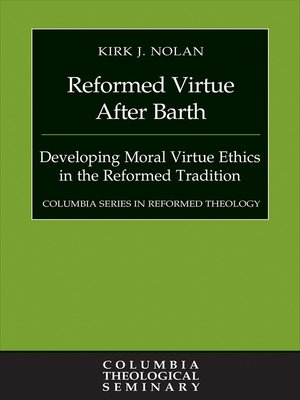Reformed Virtue after Barth
ebook ∣ Developing Moral Virture Ethics in the Reformed Tradition
By Kirk J. Nolan

Sign up to save your library
With an OverDrive account, you can save your favorite libraries for at-a-glance information about availability. Find out more about OverDrive accounts.
Find this title in Libby, the library reading app by OverDrive.



Search for a digital library with this title
Title found at these libraries:
| Library Name | Distance |
|---|---|
| Loading... |
With its focus on the traditions and communities that form us over the course of a lifetime, virtue ethics has richly expanded our understanding of what the Christian life can look like. Yet its emphasis on human virtues and habits of mind and life seems inconsistent with the Reformed tradition's insistence that sin lies at the heart of the human condition. For this reason, virtue ethics seems out of place in Reformed theology, especially in the company of the Reformed tradition's greatest twentieth-century theologian, Karl Barth.
In this new addition to the Columbia Series in Reformed Theology, Kirk Nolan argues that Barth's theology actually proves virtue ethics can be compatible with the Reformed tradition. Rather than see virtue as an inevitable and natural process of growth, Barth helps us understand that development in the Christian life comes through a process of repetition and renewal, and that all virtue comes solely as a gift from God. Nolan establishes an important bridge between Reformed moral teaching and the tradition of virtue ethics.
|With its focus on the traditions and communities that form us over the course of a lifetime, virtue ethics has richly expanded our understanding of what the Christian life can look like. Yet its emphasis on human virtues and habits of mind and life seems inconsistent with the Reformed tradition's insistence that sin lies at the heart of the human condition. For this reason, virtue ethics seems out of place in Reformed theology, especially in the company of the Reformed tradition's greatest twentieth-century theologian, Karl Barth.
In this new addition to the Columbia Series in Reformed Theology, Kirk Nolan argues that Barth's theology actually proves virtue ethics can be compatible with the Reformed tradition. Rather than see virtue as an inevitable and natural process of growth, Barth helps us understand that development in the Christian life comes through a process of repetition and renewal, and that all virtue comes solely as a gift from God. Nolan establishes an important bridge between Reformed moral teaching and the tradition of virtue ethics.







